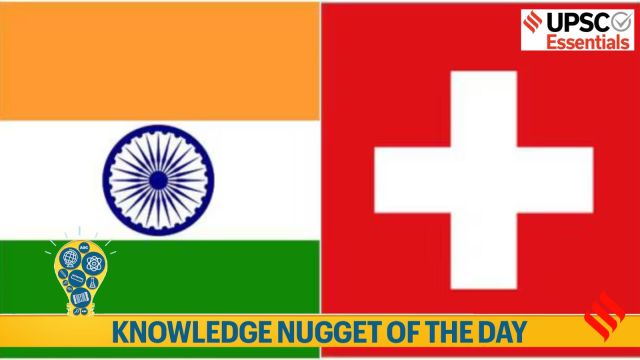Take a look at the essential concepts, terms, quotes, or phenomena every day and brush up your knowledge. Here’s your knowledge nugget for today.
Knowledge Nugget: European Free Trade Association (EFTA)
Subject: International Agreements
(Relevance: Important trade agreements that are in the news are crucial from exam perspective. The UPSC has asked questions on the Broad-based Trade and Investment Agreement (BTIA) in 2018 and the Regional Comprehensive Economic Partnership in 2016. Therefore, it is important to know about the India-EFTA trade agreement.)

Why in the news?
The Switzerland government has suspended the most favoured nation status (MFN) clause in the India-Switzerland Double Taxation Avoidance Agreement (DTAA). In response, the Ministry of External Affairs (MEA) said that its double taxation treaty with Switzerland may require renegotiation in view of its trade pact with the member states of the European Free Trade Association (EFTA).
Key Takeaways:
1. EFTA is an intergovernmental organization of four member countries that are not part of the European Union (EU): Iceland, Liechtenstein, Norway, and Switzerland.
2. It was founded in 1960 by Austria, Denmark, Norway, Portugal, Sweden, Switzerland, and the United Kingdom to promote closer economic cooperation and free trade in Europe.
3. Denmark and the United Kingdom left EFTA in 1972 to join the European Economic Community (EEC). Portugal also left EFTA in 1985 to join the EEC. EFTA’s first Free Trade Agreement was signed with Spain.
4. On 10th March 2024, India signed a trade agreement with the four-nation European Free Trade Association (EFTA). The deal will bring in $100 billion in investment over 15 years, with the EFTA looking at joint ventures that will help India diversify imports away from China.
Story continues below this ad
5. The India-EFTA deal is expected to widen the trade gap. Even as the legality of the $100 billion investment commitment by EFTA remains unclear, such investment could help India generate economic activity and jobs in exchange for giving market access to EFTA. Moreover, India could see gains in the services sector and the deal could help India power its services sector further.
6. This is the first-ever time in the history of FTAs that a legal commitment is being made to promoting target-oriented investment and the creation of jobs.

7. The funds from the EFTA region include Norway’s $1.6 trillion sovereign wealth fund, the world’s largest such ‘pension’ fund, which posted a record profit of $213 billion in 2023 on the back of strong returns on its investments in technology stocks.
8. Switzerland, which is India’s biggest trade partner among EFTA countries, decided to eliminate import duties on all industrial goods for all countries starting from January 1, 2024.
Story continues below this ad
9. The abolition of tariffs on all industrial products, including chemicals, consumer goods, vehicles, and clothing is a concern for India as industrial goods account for 98 per cent of India’s $1.3 billion merchandise exports to Switzerland in FY2023. India’s goods will face stiffer competition despite any tariff elimination that would be part of the deal
| What is ‘most favoured nation’ status? |
| The World Trade Organization’s 164 members commit to treating other members equally so they can all benefit from each other’s lowest tariffs, highest import quotas, and fewest trade barriers for goods and services. This principle of non-discrimination is known as the most favoured nation (MFN) treatment. There are some exceptions, such as when members strike bilateral trade agreements or when members offer developing countries special access to their markets. |
BEYOND THE NUGGET: Supreme Court’s ruling in the case of Nestle SA
1. Switzerland cited a 2023 ruling by the Indian Supreme Court in a case relating to Vevey-headquartered Nestle for its decision to withdraw the MFN status.
2. The Supreme Court ruling came in the Assessing Officer (International Tax) vs Nestle SA case which examined whether a government notification is essential to give effect to the most-favoured-nation (MFN) clauses under India’s tax treaties, in view of the interplay between domestic law and international law under India’s constitutional framework.
3. The court determined that a government notification is essential to give effect to the MFN clauses under India’s tax treaties because such clauses alter or vary the provisions of the Income Tax Act (IT Act). The court ruled that the MFN clause doesn’t automatically trigger when a country joins the Organisation for Economic Co-operation and Development (OECD) if the Indian government signed a tax treaty with that country before it joined the organisation.
Story continues below this ad
4. The case was filed because Nestle India believed that the MFN clause applies automatically to countries that joined the OECD after 1994. As a result, Switzerland unilaterally reduced the tax rate on dividends for Indian firms from 10% to 5%, citing treaties India signed with Lithuania and Colombia, which became OECD members in 2018 and 2020 respectively.
5. The Indian government’s stand was that the MFN clause applies only to countries that were OECD members in 1994 when the treaty was signed. India also argued that MFN benefits are not automatic and require explicit notification— SC agreed to this stand.
(Source: Supreme Court’s decision on tax treaties clarifies India’s Most Favoured Nation approach, India’s DTAA with Switzerland may require renegotiation: MEA, India signs trade agreement with EFTA: What is the significance of the deal?)
For your queries and suggestions write at khushboo.kumari@indianexpress.com
Story continues below this ad
Subscribe to our UPSC newsletter. Stay updated with the latest UPSC articles by joining our Telegram channel – IndianExpress UPSC Hub, and follow us on Instagram and X.
🚨 The Indian Express UPSC Essentials brings to you the December issue of its monthly magazine. Click Here to read. Share your views and suggestions in the comment box or at manas.srivastava@indianexpress.com🚨



































